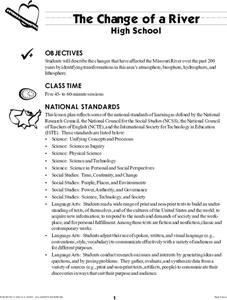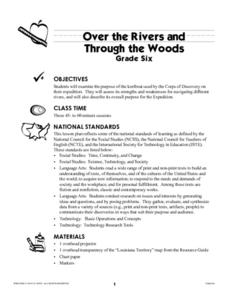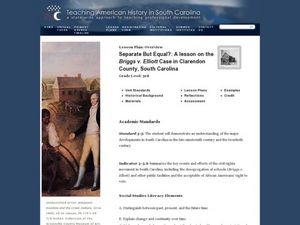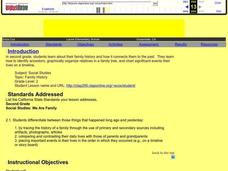Curated OER
Features of Culture
In this culture worksheet, students examine thirty features of culture, then write one example for each that is common to people in the United States.
Curated OER
American Prehistory: 8000 Years of Forest Management
Students discuss the first people to live in North America and the types of evidence we have of their existence. They complete a set of worksheets and explore their answer in group discussions.
Curated OER
Name That Point!
Young scholars compare projectile point attributes, identify and classify points, and match projectile points to a chronology.
Curated OER
What Can We Learn From Bones?
Students discuss what type of information they can gather from bones. In groups, they travel between stations in which they can view photos and listen to actual accounts of finding bones. They focus on the tools available to Native...
Curated OER
Japanese Objects as Cultural Artifacts: A Model Lesson Using Textiles
Middle schoolers complete a unit on the cultural significance of textiles in the Japanese culturre. They analyze cotton, line, silk, and wool fabrics, examine various fabric creation and decoration techniques, select an object and write...
Curated OER
Clues to the Past
Students take a 1.3 mile walking tour of Chippokes Plantation, inspect significant historic buildings and artifacts, and make inferences about plantation life from their observations while answering a series of questions.
Curated OER
Destruction in Bamiyan
Students examine the destruction of the colossal statues of Buddha, carved into sandstone cliffs of Bamiyan, Afghanistan, that were recently demolished by the Taleban. They look for photos of local artifacts that represent the culture...
Curated OER
The Foot Soldier Project for Civil Rights Studies
Students investigate the concept of foot soldiers with oral history. They are provided with primary and secondary resources. Students differentiate the terms of oral history versus the written record of history. They have class...
Curated OER
What's Missing?
Students examine their beliefs about archaeological preservation. They articulate a response to archaeological resource destruction. Students then complete two puzzles and relate them to archaeological research.
Curated OER
Inference By Analogy
Students infer the use or meaning of items recovered from a North Carolina Native American site based on 17th-century European settlers' accounts and illustration.
Curated OER
The Change of a River
High schoolers describe the changes that have affected the Missouri River over the past 200 years by identifying transformations in this area's atmosphere, biosphere, hydrosphere, and lithosphere. They research online in groups assigned...
Curated OER
The Change of a River
Students explore changes in the Missouri River. In this Missouri River activity, students discover that changes in the atmosphere cause changes in the river. Students search the Internet for information about the Missouri River and its...
Curated OER
Stone Tool Scavenger Hunt
Seventh graders use Internet to familiarize themselves with variety of stone tools used by early man, create information chart describing each tool and its purpose, and discuss why tools have survived thousands of years.
Curated OER
The Twentieth Century
Fifth graders summarize a decade in the twentieth century and compare it to another decade. They present facts in a Hyperstudio document that includes text, photos, and audio to describe the decade.
Curated OER
Over the Rivers and Through the Woods
Sixth graders examine the purpose of the keelboat used by the Corps of Discovery on the Lewis and Clark expedition. They assess its strengths and weaknesses for navigating different rivers, and describe its overall purpose for the...
Curated OER
Using Primary Sources to Discover Reconstruction
Fifth graders discover how reconstruction had an impact on racial issues in the United States. In this Reconstruction lesson, 5th graders are introduced to primary vs. secondary resources and then rotate through stations to view...
Curated OER
Regions of the United States
Fifth graders collect data about regions of the United States using the Internet, library books, and encyclopedias. They write an essay persuading people to visit their state.
Curated OER
Preserve is the Word
Students investigate a list of archaeological ethical questions. They select a question/issue and design a 3-minute (maximum) PSA to persuade the public to agree with their idea. They conduct research or interviews with experts to be...
Curated OER
The Battle of Fort Moultrie
Eighth graders interpret historical evidence presented in primary and secondary resources. In this American Revolution lesson, 8th graders examine the Battle of Fort Moultrie and create their own historical narratives regarding the event.
Curated OER
Separate But Equal? A Lesson on the Briggs v. Elliott Case in Claredon County, SC
Third graders discussschool integration. In this racial inequality lesson, 3rd graders read Remember: The Journey to School Integrationand discuss the school facilities and how people must have felt. Students watch a video to learn...
Curated OER
Traveling Southern Style: A Lesson on the Jim Crow Laws
Third graders create a poster of a travel route. In this discrimination lesson, 3rd graders read The Gold Cadillac and use it to discuss the problems African Americans faced while traveling south in the 1950's. Students compare three...
Curated OER
Art -- The Secret to Freedom
Fourth graders create a coded message in a quilt. In this art instructional activity students demonstrate the communication used by the Underground Railroad. Students work in a group to make a quilt with a code in it.
Curated OER
On the Road Again
Students examine migration patterns in Africa and China. They watch excerpts from a documentary, define key vocabulary words, complete various student organizers, and create a poster.
Curated OER
We Are Family
Second graders research their family history and how it connects them to the past. They identify their ancestors, graphically organize relatives in a family tree, and chart significant events in their lives on a timeline.

























